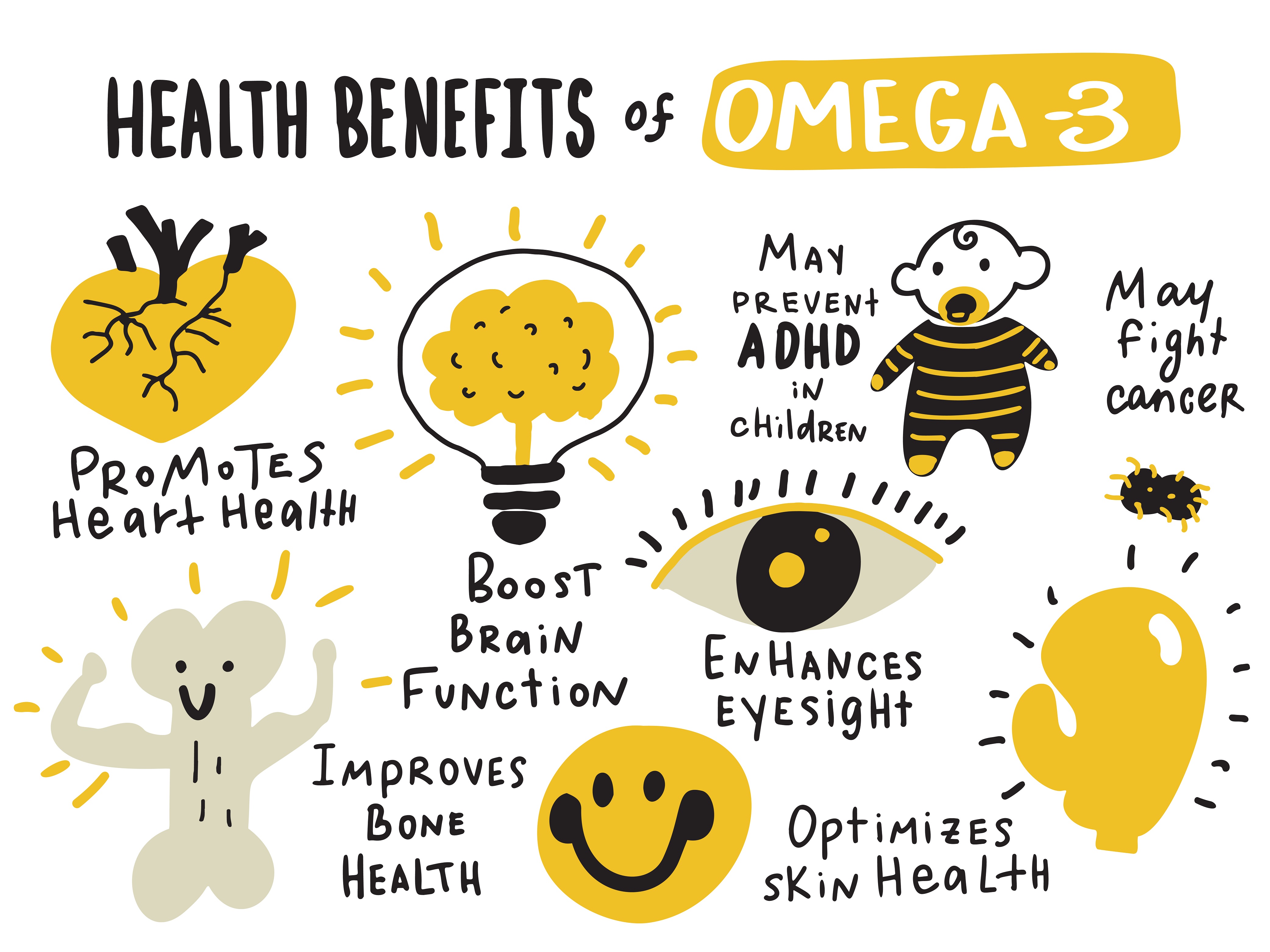As indicated by the fat-free product boom a couple decades back, there indeed was the widespread belief that all fat were a substance to be minimized, or avoided altogether. But with the forward march of research, we come to understand that different fat had different effects on health. Since it's human nature to think in black and white terms, the great divide initially fell between saturated and mono- or polyunsaturated fatty acids. Saturated fatty acids were thought to be the root of all evil, conjuring images of arterial plaque and eventual heart failure, while unsaturated fat was regarded as a universally angelic substance. This turned out to be a gross oversimplification of reality.
Omega-3 Fatty Acids
Omega- 3 fatty acids are essential for normal growth and development, but are noted specifically for their powerful influence over multiple physiological processes. Alpha-linolenic acid, one of the two essential fatty acids that the body cannot biosynthesize and must get from the diet, is an omega-3.
Eicosapentanoic acid (EPA) and docosahexanoic acid (DHA) can be derived from fish oil, and to a lesser degree, flaxseed oil.Consumption of EPA and DHA has an appreciable number of positive health effects, including decreases in blood platelet aggregation, lowered blood pressure, enhancement of smooth muscle function, decreased inflammation, alleviation of dyslipidemia, and treatment of mood disorders. Archaeological research postulates that humans were biologically designed to thrive on a diet whose ratio of omega-6 to omega-3 fatty acids was approximately 1:1. Today, consumption of omega-6 to omega-3 fatty acids is estimated at roughly 25:1.
This is due in part to a predominance of omega-6 oils available commercially in our food supply (corn oil, sunflower oil, safflower oil, refined packaged grain products, and pastries) and a relative minority of omega-3 sources (fatty marine fish such as salmon, mackerel, herring, and flaxseed oil, walnuts, and small amounts in canola oil).

Fat Loss Supplement
Human studies examining the effect of fish oil supplementation on body composition are scarce, but that makes it easy to pick them apart. Research team examined the effects of omega-3 supplementation on severely obese female inpatients undergoing a 3-week very low calorie (525 kcal) in-patient weight reduction treatment. Calories were controlled to accommodate the supplemental omega-3, which was 2.8g/day. Result? The omega-3 supplemented group lost 1.5 kg body weight more than the group without omega-3 supplement.
Over-doing Oil Supplementation
Yes, there is always a dark side. In the world of unchecked marketing hype, fish oil has definitely gotten the ”more is better“ stamp. The problem is EPA and DHA have a well-documented ability to suppress the body's immune response. Although not as consistent as the immune effects, data also exist on the ability of EPA and DHA to increase bleeding time and oxidation.
Take Home Tips
The cardio-protective benefits of increasing the dietary proportion of omega-3 fatty acids is seen consistently in trials involving various populations and protocols. Fish oil is one of the few supplements that actually has a substantial body of scientific evidence backing it up.
However, it's easy to think in terms of pills instead of food. Those who love fish and have the time or resources to prepare or order it, can simply increase or maintain their intake of fatty fish such as salmon, mackerel, lake trout, herring, albacore tuna, and sardines. There's always more complete and synergistic nutrition contained within whole foods. Having 300g fatty fish a minimum of 3 times a week would exempt most people from needing fish oil supplementation. For those who can't or won't eat fish, there is always fish oil capsules, which thankfully are inexpensive, and more convenient than getting your omega-3 through fish.
Looking at the body of evidence as a whole, fish oil has great potential for improving cardiovascular health. But for reducing body fat, the effects are minor. Let's not forget that fish oil isn't some magical negative-calorie food. It still contains 9 calories per gram, and no matter how much of those calories are used in its processing within the body, it's still a net gain in calories after consumption.
Get a variety of fats in your diet, and get them from whole foods whenever possible. Fish oil is merely one of many agents that can contribute to optimal health within the context of well-balanced nutrition.






